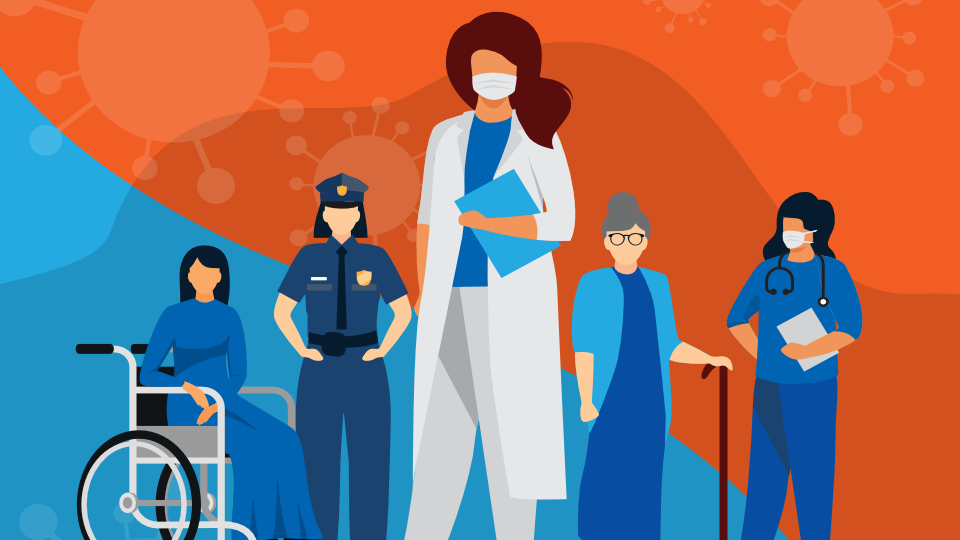COVID-19 creates urgency to innovate delivery of specialist services to women exposed to violence
UN Women launched the rapid assessment “The impact of the COVID-19 pandemic on specialist services for victims and survivors of violence in the Western Balkans and Turkey.” The rapid assessment provides a snapshot of the pandemic’s impact on 40 civil society organizations delivering specialist services and its impact on their beneficiaries.Date:

More than 80 representatives of civil society organisations, the European Commission, Council of Europe, European Institute for Gender Equality, EU delegations and UN Women across the Western Balkans and Turkey attended the virtual launch of the rapid assessment “The impact of the COVID-19 pandemic on specialist services for victims and survivors of violence in the Western Balkans and Turkey: A proposal for addressing the needs.”
The COVID-19 has deeply affected the lives of women and girls who are at increasing risk of different forms of violence nurtured by public measures to stem the pandemic. In parallel, the pandemic has also impaired efforts to end violence against women, including the way civil society organizations (CSOs) delivering specialist services operate, as well as women’s access to those services. Conducted in the Western Balkans – Albania, Bosnia and Herzegovina, Kosovo*, Montenegro, North Macedonia, Serbia – and Turkey, the rapid assessment serves as a snapshot of the impact of the COVID-19 pandemic on 40 civil society organizations, delivering specialist services, and their beneficiaries.
Blerta Cela, the UN Women Deputy Regional Director for Europe and Central Asia, said: “We conducted the rapid assessment in aftermath of the COVID-19 outbreak to know better what the needs, challenges and solutions were to provide specialist services to women who experience violence. The report also provides us a road map to support our CSO partners and all governments throughout the region. Now is the time to turn challenges into opportunities and to continue the advocacy efforts to shape better policies that serve women and communities on the ground.”
The assessment documents how the pandemic unveiled more clearly weak spots in the system for prevention and response, which can be further strengthened through targeted support. It also showcased particular needs of women’s organizations to offer specialist services.
Liselotte Isaksson, Head of Sector for the Western Balkans Regional Cooperation and Programmes and Civil Society and Social Inclusion at the Directorate General for European Neighbourhood Policy and Enlargement Negotiations, expressed her gratitude for conducting the rapid assessment in light of COVID-19: “It is very important to us that the most vulnerable groups are not left behind. This is why we are happy that we could adjust our support in a way that better addresses organizations’ most urgent needs while operating in a crisis and delivering specialised services to women exposed to violence.”
Marija Babović, lead researcher of the rapid assessment, presented the main findings of the report, sharing the challenges organizations faced while providing support to women subjected to violence, but also good practices and recommendations to address the gaps exposed by the pandemic. “We can all together explore new opportunities for innovative approaches in light of the COVID-19 pandemic, while offering support to women. Let’s exchange experiences, practices and change the way we operate and work further on ending violence against women,” said Babović.
In this regard, the representatives of CSOs mentioned their innovative solutions to addressing pressing issues, but also suggested new ways of cooperation. “As a mental health worker, it would be great to establish a working group of the existing psychosocial support workers in the organizations across the Western Balkans and Turkey. We can use current experiences to further develop working protocols that are more in line with the new reality that has come with the COVID-19 crisis,” said Dorontinë Berisha, a civil society representative from Albania.
The rapid assessment provides practical and clustered recommendations to overcome identified challenges and needs faced by civil society organizations on the ground to better serve women and girls during COVID-19 and the next public emergency. One of the crucial recommendations concerns outreach, specifically informing women from marginalized groups about all available services. Other recommendations that could help organizations to adjust and innovate while delivering specialist services are per below:
- Concerning helplines - increase the digital skills of staff providing services to be able to use diverse digital channels of communication, such as social media, mobile applications and similar, and to instruct beneficiaries on how to use digital communication channels to access services;
- Concerning shelters - update protocols and procedures with new health safety measures, including procedures for testing prior to accommodation in shelters or separate premises for newly admitted women before they are tested for COVID-19;
- Concerning psychosocial counselling - develop protocols that regulate a new form of communication via chat/e-mails in accordance with Istanbul Convention standards;
- Concerning free legal aid - establish a web-based platform for legal counselling and contracting lawyers supported by law students, also accessible to women with disabilities;
- Concerning support in access to healthcare - support local gender-based violence coordinators in keeping regular communication with survivors and the inclusion of local administrators in identifying violence against women and girls;
- Concerning support to child witness - engage with the Order of Psychologists to include them in the referral of violence against women with children;
- Concerning awareness-raising - train healthcare professionals on the connection between VAWG and health crises, and train on burn-out and support to healthcare professionals dealing with the COVID-19 pandemic.
The rapid assessment was prepared by UN Women Regional Office for Europe and Central Asia, within the Regional Programme on Ending Violence against Women in the Western Balkans and Turkey “Implementing Norms, Changing Minds,” funded by the European Union.
* For the European Union, this designation is without prejudice to positions on status, and is in line with UNSCR 1244/1999 and the ICJ Opinion on the Kosovo declaration of independence. For UN Women, references to Kosovo shall be understood to be in the context of UN Security Council Resolution 1244 (1999).